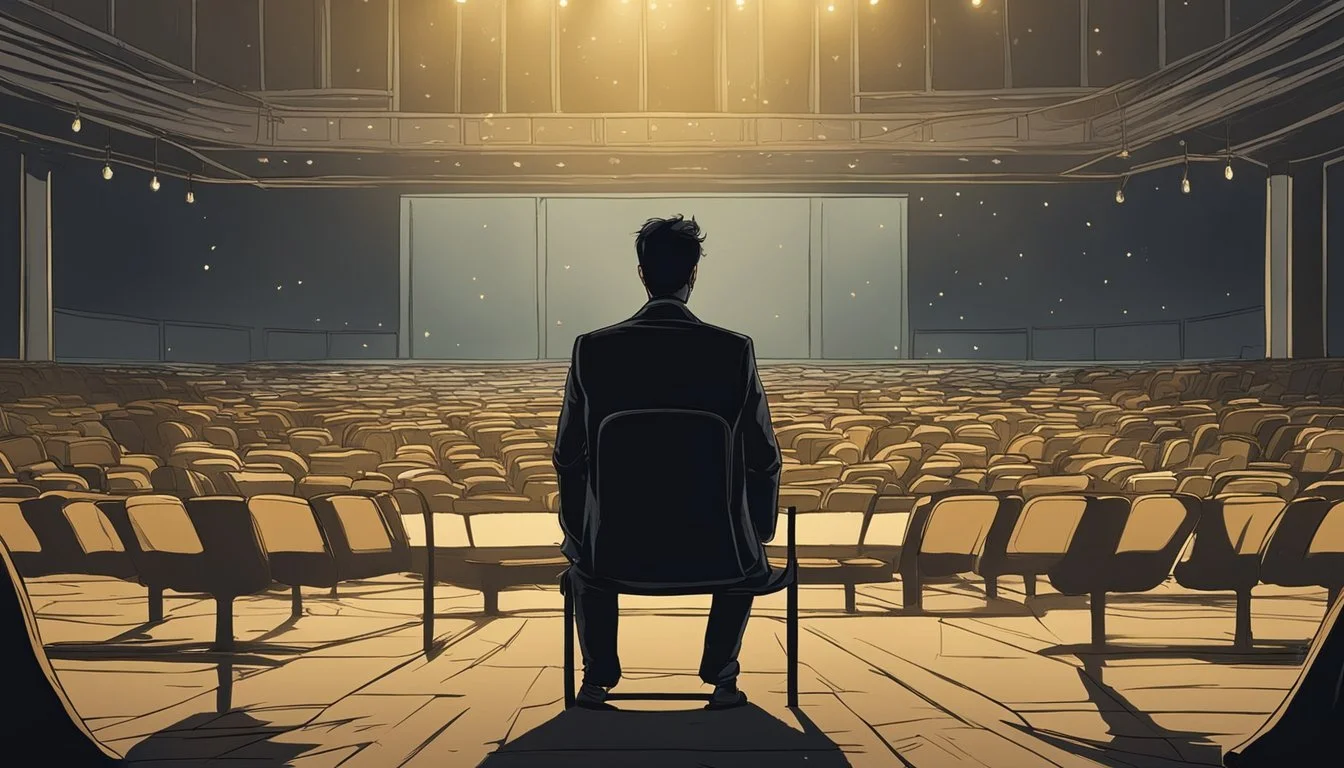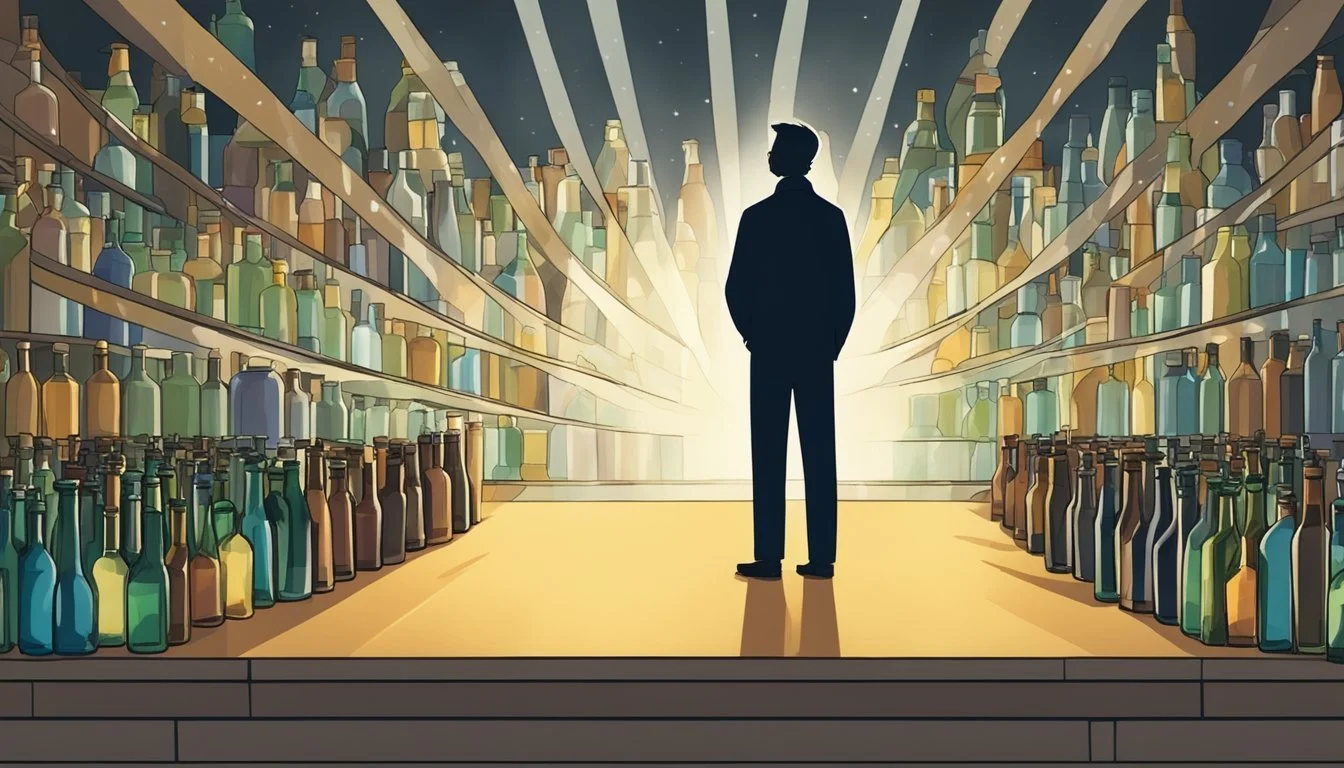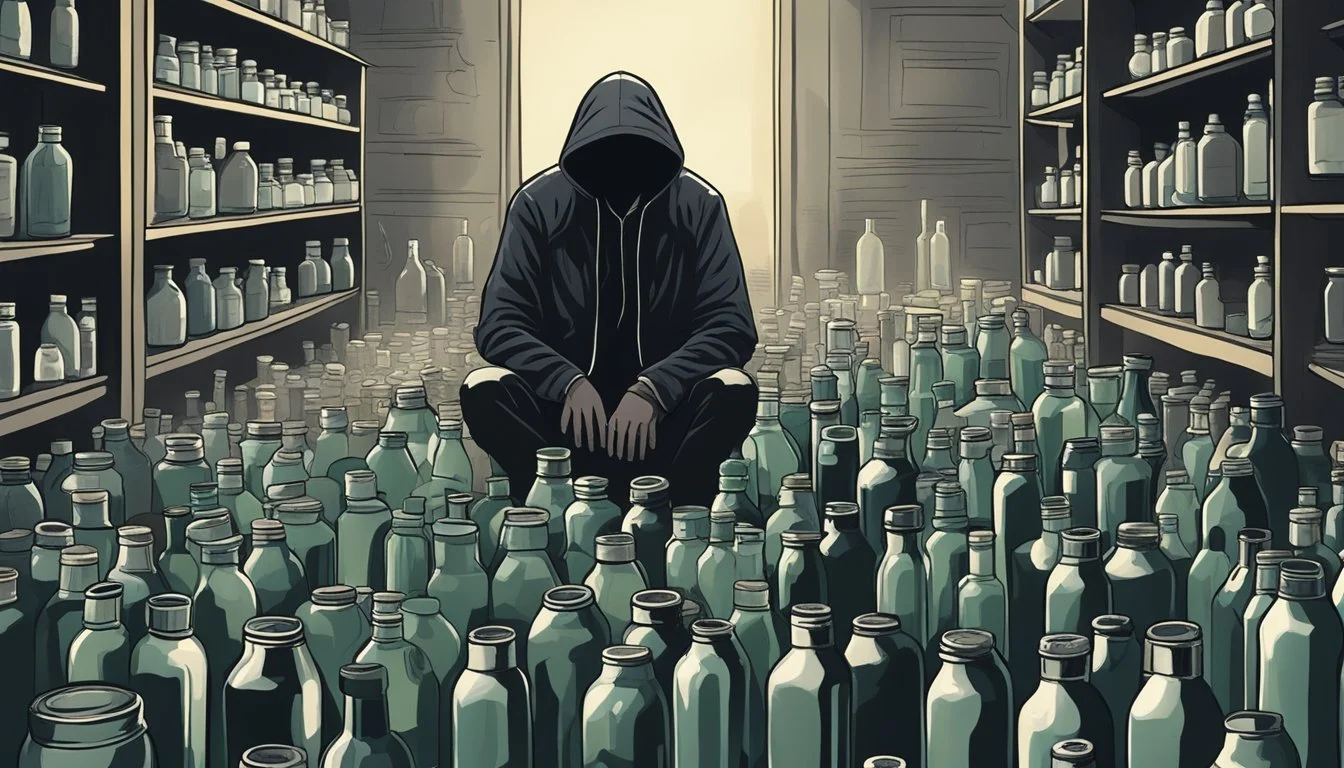From Fame to Fall: David Arquette's Struggle with Depression and Substance Abuse
A Hollywood Cautionary Tale
David Arquette's journey through Hollywood stardom took a dark turn as he grappled with depression and substance abuse. The actor, known for his roles in the Scream franchise, faced personal struggles that threatened to overshadow his professional success.
Arquette's battle with alcoholism and depression intensified following his highly publicized split from wife Courtney Cox in 2010. The end of their 11-year marriage served as a catalyst, pushing him towards unhealthy coping mechanisms. As he tried to navigate the pressures of fame and personal turmoil, Arquette turned to alcohol and other substances.
The actor's struggles culminated in a stint at the Betty Ford Center, where he sought treatment for depression and alcohol abuse. This marked a turning point in Arquette's life, as he began to confront his demons and work towards recovery. His story serves as a stark reminder of the challenges that can lurk beneath the glittering surface of celebrity life.
Early Life and Rise to Fame
David Arquette's journey from a showbiz family to Hollywood stardom was shaped by his unique upbringing and early breakthrough roles. His family legacy and natural talent paved the way for a meteoric rise in the entertainment industry.
Family Background
David Arquette was born on September 8, 1971, in Bentonville, Virginia. He comes from a family deeply rooted in the entertainment world. His father, Lewis Arquette, was an actor, while his mother, Brenda Denaut, worked as an acting teacher and therapist. David's siblings - Rosanna, Richmond, Patricia, and Alexis - all pursued acting careers as well.
The Arquette family's showbiz connections extend further back. David's grandfather, Cliff Arquette, was a well-known comedian who created the character Charley Weaver for "Hollywood Squares." This rich theatrical heritage provided David with a natural environment to develop his acting skills from a young age.
Breakthrough Roles
David Arquette's acting career took off in the early 1990s. He gained attention with his role in the 1992 film "Buffy the Vampire Slayer," which helped establish him as a rising talent in Hollywood. However, it was his portrayal of Deputy Dewey Riley in the "Scream" series that catapulted him to stardom.
The first "Scream" film, released in 1996, became a massive hit and launched Arquette into the spotlight. His performance earned him a Teen Choice Award and two Blockbuster Entertainment Awards. This success led to more prominent roles and solidified his status as a recognizable face in the entertainment industry.
Professional Highs and Relationship Milestones
David Arquette's career has been marked by notable achievements in acting and wrestling, as well as a high-profile marriage to actress Courteney Cox. His journey has been filled with both professional successes and personal challenges.
Success in Acting
David Arquette rose to fame in the mid-1990s with his role as Deputy Dewey Riley in the "Scream" franchise. The horror-comedy series became a cultural phenomenon, catapulting Arquette into the spotlight. He went on to star in various films, including the romantic comedy "Never Been Kissed" alongside Drew Barrymore.
Arquette's acting career also extended to television. He appeared in popular shows and made guest appearances on series like "Friends," where his then-wife Courteney Cox starred.
His versatility as an actor allowed him to take on both comedic and dramatic roles, showcasing his range and talent in the entertainment industry.
Wrestling Career
In an unexpected career move, David Arquette ventured into professional wrestling. In 2000, he won the WCW World Heavyweight Championship, a controversial decision that sparked debate among wrestling fans.
Despite criticism, Arquette embraced his wrestling persona. He made appearances in World Championship Wrestling (WCW) events and even participated in matches.
Years later, Arquette returned to wrestling, competing in independent promotions. This resurgence demonstrated his passion for the sport and his willingness to challenge himself outside of acting.
Marriage with Courteney Cox
David Arquette's relationship with Courteney Cox began on the set of "Scream" in 1996. The couple married in 1999, becoming one of Hollywood's most recognizable pairs.
Their marriage lasted 11 years before they announced their separation in 2010. Despite the split, Arquette and Cox maintained a amicable relationship, particularly for the sake of their daughter, Coco.
The couple finalized their divorce in 2013. Throughout their separation and after, they continued to co-parent Coco and support each other's endeavors.
Their relationship, both during and after marriage, garnered significant media attention, reflecting the public's interest in celebrity partnerships and their outcomes.
Struggles with Mental Health and Addiction
David Arquette's battle with depression and substance abuse deeply impacted his life and career. His journey through addiction and mental health challenges shed light on the pressures of fame and the long road to recovery.
Encounters with Alcohol and Drugs
Arquette's struggles with alcohol began early in his career. He turned to drinking as a coping mechanism for stress and anxiety. His alcohol consumption escalated over time, leading to dangerous levels of abuse.
Drugs also played a role in Arquette's addiction. He experimented with various substances, further complicating his mental health issues. The actor's partying lifestyle became increasingly problematic, affecting his personal relationships and professional commitments.
Arquette's substance abuse reached a critical point, prompting concerns from family, friends, and colleagues. His behavior became erratic, and his health deteriorated as a result of his addictions.
Impact of Fame on Mental Health
The pressures of fame took a significant toll on Arquette's mental wellbeing. Constant public scrutiny and high expectations exacerbated his existing vulnerabilities. He struggled to maintain a positive self-image amid intense media attention.
Depression became a major challenge for Arquette. The actor experienced periods of low mood, lack of motivation, and feelings of worthlessness. These symptoms often intertwined with his substance abuse issues, creating a vicious cycle.
The entertainment industry's fast-paced nature and demanding schedule contributed to Arquette's mental health decline. Balancing work commitments with personal struggles proved increasingly difficult.
Journey Towards Sobriety
Recognizing the need for change, Arquette decided to seek professional help. He entered a rehab program to address his addiction and mental health issues. The actor committed to a structured treatment plan, focusing on both his substance abuse and underlying psychological challenges.
In rehab, Arquette learned coping strategies and tools for managing his depression and cravings. He participated in therapy sessions and support groups, building a foundation for long-term recovery.
Arquette's path to sobriety involved setbacks and relapses, but he remained determined. He embraced a holistic approach to recovery, incorporating physical exercise, meditation, and healthier lifestyle choices into his routine.
Path to Recovery and Personal Growth
David Arquette's journey toward healing involved professional help, personal coping strategies, and a renewed focus on creativity and wellness. His path led him from the depths of addiction to a place of self-discovery and growth.
Embracing Rehabilitation
Arquette recognized the need for professional intervention to address his substance abuse issues. He entered a rehab facility where he received structured support and therapy. The actor committed to the program, engaging in group sessions and individual counseling.
During his time in rehab, Arquette learned about the underlying causes of his addiction. He worked on developing healthier coping mechanisms and strategies to maintain sobriety. The experience provided him with tools to manage stress and emotions without turning to alcohol or drugs.
Arquette's time in rehabilitation also helped him reconnect with his personal values and goals. He gained a clearer perspective on his life and career, setting the stage for lasting change.
Personal Coping Strategies
After leaving rehab, Arquette implemented various coping strategies to maintain his sobriety and mental health. He incorporated yoga and meditation into his daily routine, finding these practices helpful in managing stress and anxiety.
Arquette also focused on building a strong support network. He attended support group meetings and surrounded himself with positive influences. The actor made efforts to repair relationships strained by his past behavior.
Physical exercise became another important aspect of Arquette's recovery. He engaged in regular workouts, which helped improve his mood and overall well-being. Arquette also explored new hobbies and interests as healthy alternatives to his previous destructive habits.
Renewed Focus on Creativity and Wellness
As part of his recovery, Arquette redirected his energy toward creative pursuits. He returned to acting with a fresh perspective, taking on projects that aligned with his personal growth.
The actor also explored other forms of artistic expression. He dabbled in writing and producing, finding fulfillment in these new creative outlets. Arquette's renewed creativity became a positive force in his life, providing purpose and motivation.
Wellness became a priority for Arquette. He adopted a healthier lifestyle, focusing on nutrition and self-care. This holistic approach to well-being complemented his sobriety efforts and supported his mental health.
Arquette's journey of recovery and personal growth transformed his outlook on life. He embraced vulnerability, sharing his experiences to help others facing similar challenges.
Career Resurgence and Documentary
David Arquette's journey took an unexpected turn as he sought to reclaim his place in entertainment. His efforts to reestablish himself spanned acting, wrestling, and a revealing documentary.
Return to Acting
Arquette gradually reemerged in Hollywood after a period of reduced visibility. He took on supporting roles in independent films and made guest appearances on television shows. In 2018, he appeared in the comedy "Saving Flora" and had a recurring role in the TV series "Creepshow" in 2019.
Arquette also reunited with his "Scream" co-stars for the fifth installment of the franchise in 2022. This return to the iconic horror series marked a significant moment in his acting comeback.
Revisiting the Wrestling Ring
In 2018, Arquette made a surprising return to professional wrestling, nearly two decades after his controversial World Championship Wrestling stint. He participated in independent wrestling promotions, facing both praise and criticism from fans and fellow wrestlers.
Arquette's return included matches in Championship Wrestling from Hollywood and Game Changer Wrestling. His dedication to improving his skills and earning respect in the wrestling community became a central focus of his resurgence.
Documenting Personal Challenges
The 2020 documentary "You Cannot Kill David Arquette" chronicled Arquette's wrestling comeback and personal struggles. The film explored his battle with addiction, depression, and his quest for redemption in the wrestling world.
Directors David Darg and Price James captured Arquette's journey, including intense training sessions and high-risk matches. The documentary received positive reviews, with critics praising its honesty and unique perspective on fame and personal reinvention.
"You Cannot Kill David Arquette" earned an 84% approval rating on Rotten Tomatoes. Critics noted the film's ability to blend the kayfabe of professional wrestling with Arquette's real-life challenges.
Impact on Public Perception and Legacy
David Arquette's journey from Hollywood stardom to professional wrestling and struggles with substance abuse significantly shaped his public image. His unconventional career choices and personal battles altered how audiences and the industry viewed him.
Altering the Narrative
Arquette's foray into professional wrestling in 2000 marked a turning point in his public perception. Known for roles in films like "Never Been Kissed," his sudden appearance in World Championship Wrestling (WCW) surprised many fans. His brief reign as WCW World Heavyweight Champion was met with controversy and criticism from wrestling purists.
This unexpected career move overshadowed his acting accomplishments, leading to a shift in how the public viewed him. Arquette's reputation became entangled with debates about celebrity involvement in wrestling, often overshadowing his talents as an actor.
Influences on and by Professional Wrestling
Arquette's involvement in professional wrestling left a lasting impact on both his career and the industry. His championship win remains a contentious topic among wrestling fans. It influenced how wrestling promotions approached celebrity involvement in storylines.
In turn, wrestling affected Arquette's life profoundly. It fueled his passion for the sport and later contributed to his struggles with substance abuse. His 2018 return to independent wrestling showcased his dedication to the craft and desire to earn respect from the wrestling community.
Contribution to Entertainment and Society
Despite controversies, Arquette's diverse career has made unique contributions to entertainment. His roles in the "Scream" franchise helped define 1990s horror-comedy. His openness about personal struggles has raised awareness about mental health and substance abuse issues in Hollywood.
Arquette's willingness to discuss his battles with depression and addiction has helped destigmatize these topics. His journey serves as a reminder of the pressures of fame and the importance of seeking help. Through his experiences, Arquette has become an advocate for mental health awareness in the entertainment industry.






